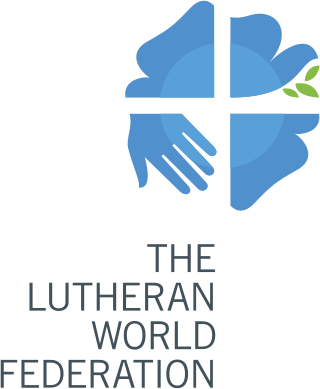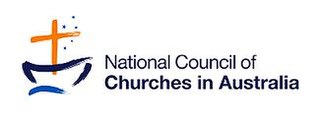An ecumenical council, also called general council, is a meeting of bishops and other church authorities to consider and rule on questions of Christian doctrine, administration, discipline, and other matters in which those entitled to vote are convoked from the whole world (oikoumene) and which secures the approbation of the whole Church.

The World Council of Churches (WCC) is a worldwide Christian inter-church organization founded in 1948 to work for the cause of ecumenism. Its full members today include the Assyrian Church of the East, the Oriental Orthodox Churches, most jurisdictions of the Eastern Orthodox Church, the Union of Utrecht, the Lutheran World Federation, the Anglican Communion, the Mennonite churches, the World Methodist Council, the Baptist World Alliance, the World Communion of Reformed Churches, the Pentecostal churches, the Moravian Church and the Malankara Mar Thoma Syrian Church. Notably, the Catholic Church is not a full member, although it sends delegates to meetings who have observer status.
Chalcedonian Christianity is a term referring to the branches of Christianity that accept and uphold theological resolutions of the Council of Chalcedon, the fourth ecumenical council, held in 451. Chalcedonian Christianity accepts the Christological Definition of Chalcedon, a Christian doctrine concerning the union of two natures in one hypostasis of Jesus Christ, who is thus acknowledged as a single person (prosopon). Chalcedonian Christianity also accepts the Chalcedonian confirmation of the Niceno-Constantinopolitan Creed, thus acknowledging the commitment of Chalcedonism to Nicene Christianity.

Ecumenism – also called interdenominationalism, or ecumenicalism – is the concept and principle that Christians who belong to different Christian denominations should work together to develop closer relationships among their churches and promote Christian unity. The adjective ecumenical is thus applied to any non-denominational initiative that encourages greater cooperation and union among Christian denominations and churches.
The National Council of the Churches of Christ in the USA, usually identified as the National Council of Churches (NCC), is the largest ecumenical body in the United States. NCC is an ecumenical partnership of 38 Christian faith groups in the United States. Its member communions include mainline Protestant, Eastern Orthodox, African-American, evangelical, and historic peace churches. Together, it encompasses more than 100,000 local congregations and 40 million adherents. It began as the Federal Council of Churches in 1908, and expanded through merger with several other ecumenical organizations to become the National Council of Churches in 1950. Its Interim President and General Secretary is Bishop Vashti Murphy McKenzie.

The Lutheran World Federation is a global communion of national and regional Lutheran denominations headquartered in the Ecumenical Centre in Geneva, Switzerland. The federation was founded in the Swedish city of Lund in the aftermath of the Second World War in 1947 to coordinate the activities of the many differing Lutheran churches. Since 1984, the member churches are in pulpit and altar fellowship, with common doctrine as the basis of membership and mission activity.
The World Student Christian Federation (WSCF) is a federation of autonomous national Student Christian Movements (SCM) forming the youth and student arm of the global ecumenical movement. The Federation includes Orthodox, Protestant and Catholic students.
The infallibility of the Church is the belief that the Holy Spirit preserves the Christian Church from errors that would contradict its essential doctrines. It is related to, but not the same as, indefectibility, that is, "she remains and will remain the Institution of Salvation, founded by Christ, until the end of the world." The doctrine of infallibility is premised on the authority Jesus granted to the apostles to "bind and loose" and in particular the promises to Peter in regard to papal infallibility.
The Reformed Ecumenical Council (REC) was an international organization of Calvinist churches. It had 39 member denominations from 25 countries in its membership, and those churches have about 12 million people together. It was founded August 14, 1946 in Grand Rapids, Michigan as the Reformed Ecumenical Synod. The Reformed Ecumenical Council was the second largest international Calvinist alliance and the more conservative of the two largest. In 1953, The Reformed Ecumenical Synod meeting in Edinburgh decided to advise its member churches not to join the World Council of Churches as currently constituted because it “permits essentially different interpretations of its doctrinal basis, and thus the nature of the Christian faith” and “represents itself as a Community of faith, but is actually not this” due to member churches holding “basically divergent positions.”

The National Council of Churches in Australia (NCCA) is an ecumenical organisation bringing together a number of Australia's Christian churches in dialogue and practical cooperation.
The World Alliance of Reformed Churches (WARC) was a fellowship of more than 200 churches with roots in the 16th century Reformation, and particularly in the theology of John Calvin. Its headquarters was in Geneva, Switzerland. They merged with the Reformed Ecumenical Council in 2010 to form the World Communion of Reformed Churches.
The Federal Council of Churches, officially the Federal Council of Churches of Christ in America, was an ecumenical association of Christian denominations in the United States in the early twentieth century. It represented the Anglican, Baptist, Eastern Orthodox, Lutheran, Methodist, Moravian, Oriental Orthodox, Polish National Catholic, Presbyterian, and Reformed traditions of Christianity. It merged with other ecumenical bodies in 1950 to form the present day National Council of Churches.

Christians in Morocco constitute less than 1% of the country's population of 33,600,000. Approximately one third of Christians in the country are Protestants. It is estimated that there are about 10,000 Protestants in the country, most of them from sub-Saharan Africa. Other estimates place the number at approximately 3,000. The largest Protestant denomination in the country is the Evangelical Church of Morocco, which has links to the Reformed Church of France.

The World Communion of Reformed Churches (WCRC) is the largest association of Reformed (Calvinist) churches in the world. It has 230 member denominations in 108 countries, together claiming an estimated 80 million people, thus being the fourth-largest Christian communion in the world after the Catholic Church, Eastern Orthodox Church, and the Anglican Communion. This ecumenical Christian body was formed in June 2010 by the union of the World Alliance of Reformed Churches (WARC) and the Reformed Ecumenical Council (REC).

The Protestant Church of Algeria is a federation of Protestant churches from the Reformed and Methodist traditions established in 1972 in Algeria. It is officially recognised by the government of Algeria as the Association of the Protestant Church of Algeria.

The National Council of Churches in the Philippines is a fellowship of ten Protestant and non Roman Catholic Churches in the Philippines denominations, and ten service-oriented organizations in the Philippines. A member of the World Council of Churches and the Christian Conference of Asia, the NCCP represents close to twelve million Protestant adherents. Advocacy for environmental protection and against large-scale mining are part of its core mission. Christian organizations other than churches may be received as associate members.

The Council of Churches in Namibia (CCN) is an ecumenical organisation in Namibia. Its member churches together represent 1.5 million people, 90% of the population of Namibia. It is a member of the Fellowship of Christian Councils in Southern Africa.
The Fellowship of Christian Councils and Churches in the Great Lakes and Horn of Africa is an ecumenical Christian organization in Africa. It was founded in 1999 and is a member of the World Council of Churches. Its membership includes:








